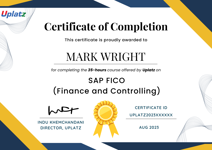Bundle Course - Financial Analysis
Self-paced videos, Lifetime access, Study material, Certification prep, Technical support, Course Completion Certificate
Uplatz
Summary
- Uplatz Certificate of Completion - Free
Add to basket or enquire
Overview
Uplatz offers this comprehensive bundle course on Financial Analysis consisting of a combo of video courses on all topics that are associated with financial analysis. You will be awarded Course Completion Certificate at the end of the course.
Uplatz provides this extensive bundle course on concepts involved in financial analysis, data modeling, number crunching, advanced calculations required to do financial analysis, reporting & visualization of data.
This Bundle Course - Financial Analysis consists of the following courses:
- Financial Accounting and Reporting
- Costing and Cost Accounting
- Business Finance and Financial Modeling
- International Accounting Standards (AS)
- Bank Audit
The Financial Analyst course also covers the most important topics related to investment banking, financial planning and analysis (FP&A), private equity, corporate development, equity research, and other areas of corporate finance.
Financial analysis is a means of evaluating the performance and appropriateness of firms, programmes, expenditures, and other financial operations. Financial analysis is often used to examine if a business is stable, solvent, liquid, or competitive enough to justify a monetary investment. Financial analysis is used to evaluate economic trends, establish monetary policies, develop long-term commercial activity plans, and find investment projects and firms. This is accomplished via the use of financial data and data synthesis. A financial analyst must examine a company's financial accounts, including the income statement, balance sheet, and cash flow statement.
This finance course will demystify financial analysis and assist you in making sound business choices. You will need to get money in order to start your business. Once you've got some cash, you'll need to figure out how to put it to the best possible use. You must also be able to conduct professional and interesting interactions with financial experts who manage financing access. This course will teach you how to properly negotiate financial possibilities as well as a range of financing sources for your company. You'll learn how to assess and analyse ideas so that you can appropriately filter them by determining the right benefits and costs. Finally, you'll discover how to appraise a firm and what securities you may be able to utilise to finance your venture.
An analyst's job is dynamic, sophisticated, and requires a wide range of talents. These abilities vary from a fundamental comprehension of financial statement data and non-financial performance measures to a deeper dive into business and financial modelling. To make educated financial choices and investments, analysts use spreadsheet models, modelling methodologies, and standard investment analysis applications as part of their arsenal. This complex course will prepare a student for a career in the fast-paced world of data and business research, as well as a better technical understanding of finance and quantitative modelling. You'll learn how to use spreadsheets to put data to work and how to use spreadsheets as a strong, accessible data analysis tool, starting with the principles of quantitative modelling. You'll also learn about corporate finance and get a deeper knowledge of finance basics via a number of real-world scenarios ranging from personal finance to business decision-making and financial intermediation.
Course media
Description
The aim of this course is to identify and analyse important financial data with a view to making financial decisions; it also looks at how to read annual reports and use ratios for decision making.
Financial Analysts are the ones who analyze the financial data of an organization and through their findings help companies to make the right business decisions. They constantly monitor the cash in-flow and transactions incurred by the organization. They must be well aware of all the financial movements within their organization and if the need arises must report for any predicament found.
The information evaluated from Finance and Financial Analysis Tools is of great importance and different interpretations and financial decisions are made on the basis of this analysis. Financial analysis indicates the performance of a firm by analysing the liquidity, profitability, financial reports, risk management, efficiency of operations of a business entity, etc.
To be a financial analyst, one should have good quantitative and analytical skills along with a good presentation expertise and should be able to handle a large volume of data.
Course Objectives
- To be able to conduct comprehensive financial analysis of an organization
- Understand financial accounting & reporting processes
- Learn cost accounting, costing & management accounting
- Develop financial models and statistical analytics on financial data
- Learn business finance
- Be able to conduct extensive audit of a bank
- Perform industry research
- Know how to assess a firm
Who is this course for?
Everyone
Requirements
Passion & determination to achieve your goals!
Career path
- Financial Analyst
- Finance Expert
- Finance Specialist
- Corporate Finance Associate
- Finance Consultant
Questions and answers
Currently there are no Q&As for this course. Be the first to ask a question.
Certificates
Uplatz Certificate of Completion
Digital certificate - Included
Course Completion Certificate by Uplatz
Reviews
Currently there are no reviews for this course. Be the first to leave a review.
Legal information
This course is advertised on reed.co.uk by the Course Provider, whose terms and conditions apply. Purchases are made directly from the Course Provider, and as such, content and materials are supplied by the Course Provider directly. Reed is acting as agent and not reseller in relation to this course. Reed's only responsibility is to facilitate your payment for the course. It is your responsibility to review and agree to the Course Provider's terms and conditions and satisfy yourself as to the suitability of the course you intend to purchase. Reed will not have any responsibility for the content of the course and/or associated materials.


